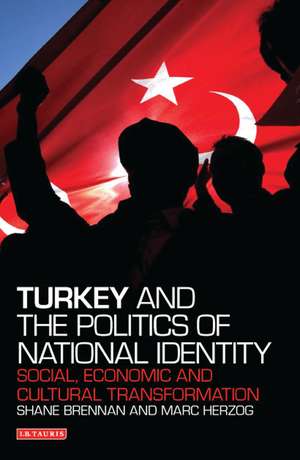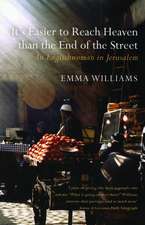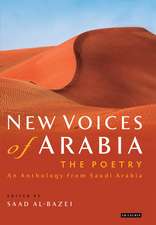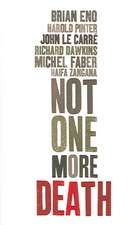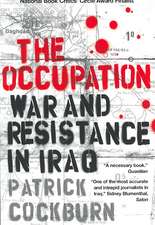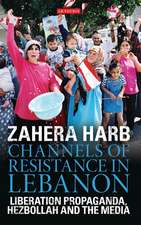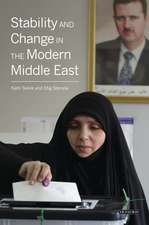Turkey and the Politics of National Identity: Social, Economic and Cultural Transformation
Autor Shane Brennan, Marc Herzogen Limba Engleză Hardback – 18 sep 2014
Preț: 775.02 lei
Preț vechi: 1113.65 lei
-30% Nou
Puncte Express: 1163
Preț estimativ în valută:
148.35€ • 161.19$ • 124.69£
148.35€ • 161.19$ • 124.69£
Carte tipărită la comandă
Livrare economică 21 aprilie-05 mai
Preluare comenzi: 021 569.72.76
Specificații
ISBN-13: 9781780765396
ISBN-10: 1780765398
Pagini: 344
Ilustrații: 12 integrated bw
Dimensiuni: 138 x 216 x 38 mm
Greutate: 0.59 kg
Ediția:New.
Editura: Bloomsbury Publishing
Colecția I.B.Tauris
Locul publicării:London, United Kingdom
ISBN-10: 1780765398
Pagini: 344
Ilustrații: 12 integrated bw
Dimensiuni: 138 x 216 x 38 mm
Greutate: 0.59 kg
Ediția:New.
Editura: Bloomsbury Publishing
Colecția I.B.Tauris
Locul publicării:London, United Kingdom
Notă biografică
Shane Brennan is Lecturer in the Department of History at Mardin University, Turkey. He holds a PhD in Ancient History from the University of Exeter. Marc Herzog is Assistant Director of the British Institute at Ankara. Formerly a Research Associate at The Foreign Policy Centre, he holds a PhD in Politics from the University of Exeter.
Cuprins
Introduction. Shane Brennan and Marc HerzogPart 1: POLITICSChapter 1: The Concept of Türkiyeli. Baskin OranChapter 2: Political Liberalization and Constitutional Changes. William HaleChapter 3: Turkey: A Rising Normative Power? Sevilay AksoyPart 2: ECONOMY AND SOCIETYChapter 4: Turkey's Economy and the EU. Canan BalkirChapter 5: Kurdish Language at Large: What has Changed? Clémence Scalbert-YücelChapter 6: Minority Identities in Contemporary Turkey. Christine AllisonPart 3: CULTUREChapter 6: Minor Literatures and their Challenge to 'National' Literature: The Turkish Case. Laurent MignonChapter 7: Queering Identities in Ottoman History and Turkish Fiction. Donna LandryChapter 8: Kurds and the 'Kurdish Opening'. Ibrahim Özco?arPart 4: PAST AND PRESENTChapter 9: Ottoman Influences in Society Today. Gerald MacleanChapter 10: Identity Formation in Contemporary Turkey: Legacies of a Pre-Turkish past. Stephen MitchellChapter 11: Invisible Change: Archaeological Practices in Turkey in the New Millennium. Burcu Erciyas
